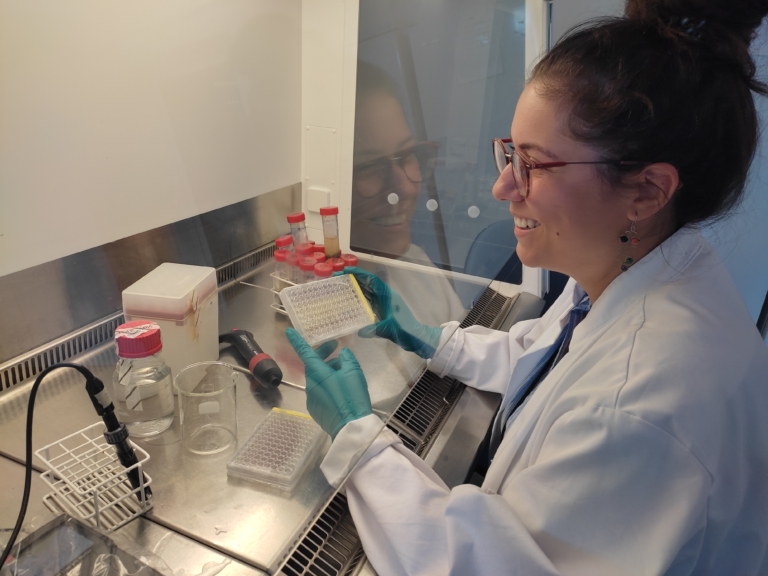"Taste-sea: Sea vegetables with enhanced flavor for future sustainable foods"
Evangelia Zioga's PhD project is based on the conviction that future food supply will depend on algae for sufficiency and sustainability. Her own contribution lies in optimizing a proven method - fermentation - with modern technology, to develop new food ingredients based on the brown algae sugar seaweed(Saccharina latissima).
"The companies have acquired knowledge about how best to cultivate the algae, and the next step in the research is to develop new products," says Evangelia Zioga. Product development has mainly focused on drying algae; fermentation could open up a new product portfolio that meets market needs. 'My hope is that fermentation can be used to extend the shelf life of algae while improving the taste and sensory experience. There is a lot to learn, algae is bursting with nutrients and biomass but we don't actually know if our digestive system can absorb them. We need to be sure that we can take advantage of the nutrients to produce the food of the future.
Fermentation of algae - challenging but promising

All of Blå Mat's doctoral students are in some sense moving into new waters, but Evangelia Zioga is also a pioneer in that she is conducting her doctoral studies at two universities, as a so-called cotutelle doctoral student. Evangelia Zioga is probably one of the first to share her PhD time between KTH in Sweden and the Technical University of Denmark, DTU.
Even when it comes to fermenting algae for food, much remains to be done. Almost all existing research on algae fermentation is related to other areas, not least fuel production. For example, producing ethanol for fuel uses yeast strains that are extremely specialized and not relevant for food.
Since Evangelia Zioga started her project in early 2022, she has conducted a literature review, among other things. The earliest relevant article on food was published as late as 2021. In addition, in order to carry out the literature review, she had to translate texts from Chinese and Japanese.
After Evangelia Zioga's first fermentation experiment, it is clear that she has several challenges to overcome. For example, the algae contain antimicrobial substances that can inhibit the growth of lactic acid cultures. Fermented algae also risk becoming slimy due to the presence of alginate, which impairs the sensory experience and makes the algae less appetizing. But Evangelia Zioga has high hopes that bacterial and yeast strains isolated from plants can provide good results. And at DTU in Lyngby, Denmark, she has access to a huge collection of such strains taken from natural environments.
Useful and sustainable ingredient
Ideally, fermentation can preserve beneficial substances while removing unwanted ones, such as iodine and heavy metals, along with water. Much work remains to be done, but being able to increase the level of umami flavor components, improve the flavor and retain all the beneficial vitamins and minerals present in the algae are motivating goals.

Algae are generally considered natural, but in order to be used more widely, they need to be processed. That's why Evangelia Zioga says it's important to demystify the finished product which - despite being processed - can provide benefits such as lower salinity and deeper flavor.
So far, Evangelia Zioga has carried out the lion's share of her work at DTU in Lyngby, but in the future the project will focus more on measuring sustainability and KTH will be the base. For example, if the project concludes that locally grown, fermented algae - which requires little energy and is cost-effective to produce - can replace some of the meat in a minced beef, it is important to know how sustainability is affected and hopefully improved.
Algae can be a future food hero, says Evangelia Zioga. "We need to broaden our food to include more marine elements. It is possible to use traditional fermentation to create new products. The project combines several research disciplines with the aim of enabling the use of algae in food and the value lies in new ingredients that can improve sustainability.
The project has points of contact with several of the other Blue Food PhD projects. Evangelia Zioga will work with Mar Vall-Llosera, Chalmers, who also works with stabilization and fermentation of algae. She has had several meetings with Kristina Bergman, KTH, to discuss life cycle analysis and she also plans to collaborate with Elena Costa, University of Gothenburg and Rise, on consumer reception of different types of algae.
The project is relevant to the research areas 2. process technologies and product development, 4. consumer attitudes and sensory, 5. sustainability analysis, 6. health and welfare and the overall research area 2. food safety.
Evangelia Zioga's project is expected to be completed in spring 2026.
Supervisors
Fredrik Gröndahl, KTH
Susan L Holdt, DTU